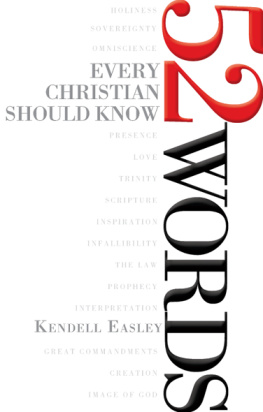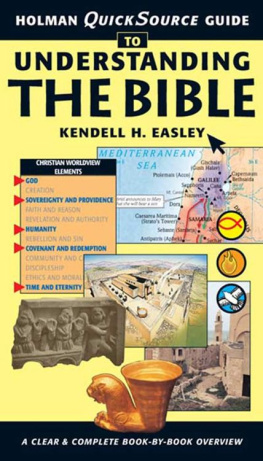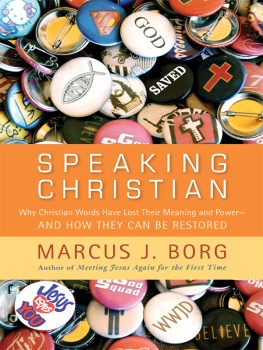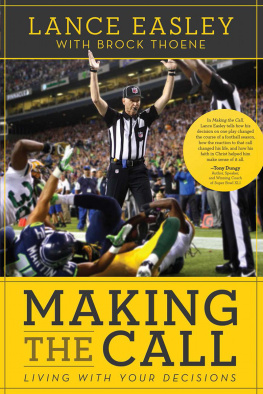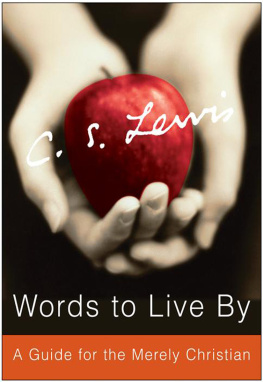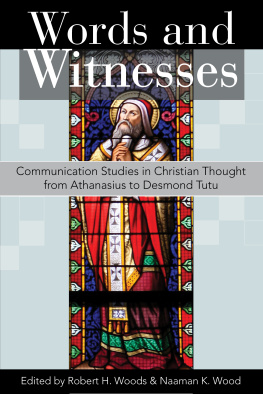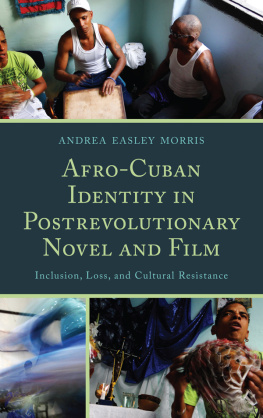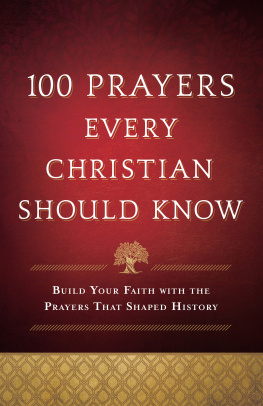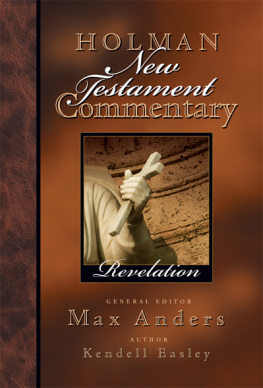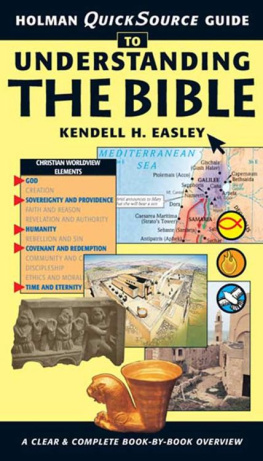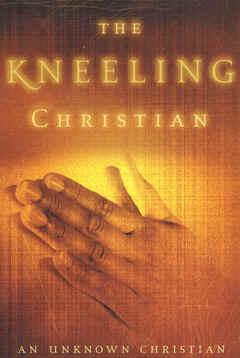Kendell Easley - 52 Words Every Christian Should Know
Here you can read online Kendell Easley - 52 Words Every Christian Should Know full text of the book (entire story) in english for free. Download pdf and epub, get meaning, cover and reviews about this ebook. year: 2009, publisher: B&H Publishing Group;Holman Reference, genre: Religion. Description of the work, (preface) as well as reviews are available. Best literature library LitArk.com created for fans of good reading and offers a wide selection of genres:
Romance novel
Science fiction
Adventure
Detective
Science
History
Home and family
Prose
Art
Politics
Computer
Non-fiction
Religion
Business
Children
Humor
Choose a favorite category and find really read worthwhile books. Enjoy immersion in the world of imagination, feel the emotions of the characters or learn something new for yourself, make an fascinating discovery.
- Book:52 Words Every Christian Should Know
- Author:
- Publisher:B&H Publishing Group;Holman Reference
- Genre:
- Year:2009
- Rating:4 / 5
- Favourites:Add to favourites
- Your mark:
- 80
- 1
- 2
- 3
- 4
- 5
52 Words Every Christian Should Know: summary, description and annotation
We offer to read an annotation, description, summary or preface (depends on what the author of the book "52 Words Every Christian Should Know" wrote himself). If you haven't found the necessary information about the book — write in the comments, we will try to find it.
52 Words Every Christian Should Know — read online for free the complete book (whole text) full work
Below is the text of the book, divided by pages. System saving the place of the last page read, allows you to conveniently read the book "52 Words Every Christian Should Know" online for free, without having to search again every time where you left off. Put a bookmark, and you can go to the page where you finished reading at any time.
Font size:
Interval:
Bookmark:


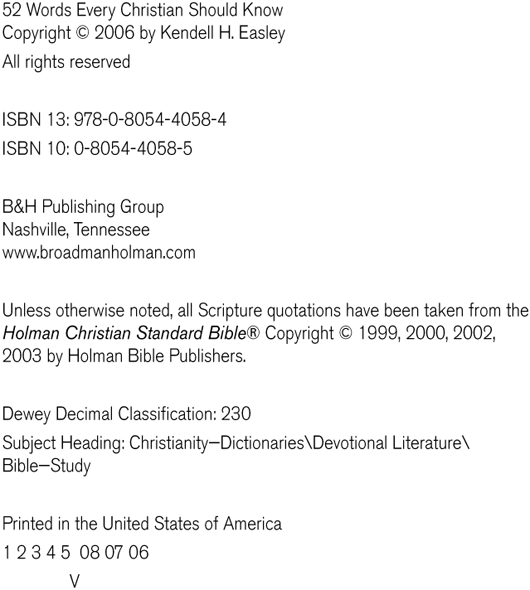
Dedicated to the glory of God
and in grateful appreciation
to my home congregation,
Germantown Baptist Church,
Germantown, Tennessee,
especially the
Perkins Friday Breakfast Fellowship
Postmodern assumptions now dominate the North American conversation landscape, such as, A term can mean whatever you want it to mean, for example, marriage. Further, many who have been in church for years have only the fuzziest notions about the meaning of central biblical or theological terms. This implies an ever greater challenge for those engaged in Christian teaching and preaching. There is a place for a book for everyday believers that says, Christian terms have standard meanings, and here are the historic, orthodox meanings of essential terms. The book in your hands was prepared for this reason.
Each of the 52 terms is presented in a two-page study, organized into 8 major biblical categories. All begin with a pertinent citation from the Holman Christian Standard Bible, continue with a concise definition, move on to a brief discussion, and close with thought questions and a devotional prayer. Why 52 terms? To learn about one Christian term each week for a year is a reasonable goal for even the busiest of persons.
I have written from a broadly evangelical perspective. My treatment is sensitive to areas where there are major differences of opinion, such as dispensational eschatology, Calvinism, Pentecostal issues, and the sacraments or ordinances. On the other hand, I affirm as a foundation the classic confessions of the churches (the Apostles' Creed and the Nicene Creed) and the five pillars of the Reformation (salvation as taught in Scripture alone, by Christ alone, by grace alone, through faith alone, to the glory of God alone). If you relate positively to these beliefs and want to gain a better understanding of essential Christian terms, this book is for you.
(traditional wording; historically associated with baptism)
I believe in God, the Father Almighty, Maker of heaven and earth;
And in Jesus Christ His only Son our Lord,
Who was conceived by the Holy Ghost, born of the Virgin Mary,
Suffered under Pontius Pilate, was crucified, dead and buried;
(He descended into hell;)
The third day He rose again from the dead; He ascended into heaven,
And sitteth on the right hand of God the Father Almighty;
From thence He shall come to judge the quick and the dead.
I believe in the Holy Ghost; the holy catholic Church;
The communion of saints; the forgiveness of sins;
The resurrection of the body; and the life everlasting. Amen.
(traditional wording; historically associated with the Lord's Supper)
I believe in one God,
The Father Almighty, Maker of heaven and earth,
And of all things visible and invisible;
And in one Lord Jesus Christ,
The only-begotten Son of God,
Begotten of His Father before all worlds,
God of God, Light of Light, very God of very God,
Begotten, not made, being of one substance with the Father;
By whom all things were made;
Who for us men and for our salvation came down from heaven,
And was made incarnate by the Holy Ghost of the Virgin Mary,
And was made man;
And was crucified also for us under Pontius Pilate;
He suffered and was buried;
And the third day He rose again according to the Scriptures,
And ascended into heaven,
And sitteth on the right hand of the Father;
And He shall come again, with glory,
To judge both the quick and the dead;
Whose kingdom shall have no end.
And I believe in the Holy Ghost the Lord, and Giver of Life,
Who proceedeth from the Father and the Son;
Who with the Father and the Son together is worshiped and glorified;
Who spake by the Prophets.
And I believe in one holy catholic and apostolic Church;
I acknowledge one baptism for the remission of sins;
And I look for the resurrection of the dead
And the life of the world to come. Amen.
Who is God? What is He like? Thinking about these questions has driven the greatest thinkers and philosophers of the ages. In today's world, the issueon the popular level at leastseems to be propelled by two notions. On one side is the idea that God is whatever or whoever the individual makes Him (or It or Her) out to be. Everybody's idea is equally valid. Do you want God to be like the Force of Star Wars? Fine, even though there's a dark side. Do you want God to be like a genie dispensing health and wealth for the asking? If this works for you, go for it. The other notion is driven by a growing awareness of the religion of Islam, which worships only one God. Many people have assumed that the God of Islam (Allah) and the God of Christianity must be identical. Thus the question arises, Is the God of Islam the Father of Jesus Christ? Are Muslims and Christiansboth claiming to worship the only deity there isserving the same God?
Christians begin with the Scriptures, not with popular culture or with someone's experiences of God. Follow the study of these seven terms that point to the true identity of the God of the Bible. In particular, note the last study, on the Trinity. If, as orthodox Christians have always affirmed, God eternally exists in three PersonsFather, Son, and Spiritthen the answer to the two questions at the end of the previous paragraph must be a resounding no.
I saw the glory of the God of Israel coming from the east. His voice sounded like the roar of mighty waters, and the earth shone with His glory. Then the Spirit lifted me up and brought me to the inner court, and the glory of the LORD filled the temple. Ezekiel 43:2,5
DEFINITION: God's glory is the display of His greatness, goodness, and beauty so that persons are aware of Him through sensory experiences such as sight and sound. To glorify God means to respond to His revealed glory in the ways Scripture teaches, such as praise, love, joy, and obedience.
Glory in the Old Testament usually represents a word meaning heaviness or weight (Hebrew kabod). Not surprisingly therefore, human beings have often recognized God's glory in weighty or massive appearances: snow-capped mountains, starry skies, roaring oceans, or a splendid house of worship such as Solomon's temple or a medieval cathedral. God's majesty or worthiness was particularly revealed when His presence accompanied the Israelites from Egypt. When the cloud rested on Sinai, Moses saw God's glory (Ex 24:15-18). That glory was also associated with the tabernacle in the wilderness and the Jersualem temple (Ex 40:34-35; 2 Ch 7:1-3). Many Jewish sources used the term shekinah (meaning that which dwells, but not found in Hebrew Scripture) to refer especially to the manifested presence of God.
In the New Testament, the Greek word for glory is doxa, as in the title of the classic hymn, The Doxology (literally, a word of glory). In the Gospels God's glory was seen by shepherds at Jesus' birth and by the disciples throughout His ministry (Lk 2:9; Jn 1:14). Jesus' death and resurrection displayed the glory of God (Jn 12:23-28; Lk 24:26). The second coming of Jesus will powerfully reveal God's glory (Mk 8:38).
Next pageFont size:
Interval:
Bookmark:
Similar books «52 Words Every Christian Should Know»
Look at similar books to 52 Words Every Christian Should Know. We have selected literature similar in name and meaning in the hope of providing readers with more options to find new, interesting, not yet read works.
Discussion, reviews of the book 52 Words Every Christian Should Know and just readers' own opinions. Leave your comments, write what you think about the work, its meaning or the main characters. Specify what exactly you liked and what you didn't like, and why you think so.

